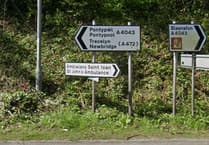A PROFESSOR of sustainable transport and former Green Party election council candidate has called on Herefordshire to adopt the Wales-wide approach to 20mph residential speed limits.
The move by John Whitelegg, visiting professor of sustainable transport at Liverpool John Moores University comes as Public Health England rates Herefordshire as “significantly worse than the England average” for road-related deaths and serious injuries.
Professor Whitelegg, who stood unsuccessfully for the Greens in Arrow ward in May, is organising a public meeting in Hereford next week in a bid to build support for the idea.
A House of Commons report, reducing the speed limit from 30 to 20mph can drastically decrease the likelihood of pedestrian fatalities from collisions, he says, with the odds dropping from one in two to one in ten.
John Whitelegg said: “Herefordshire Council agreed to support the 20mph policy in March 2020, but 41 months later there is no sign of implementation.”
While the Welsh Government is set to enforce 20mph limits in built-up areas from September 20, citing both public health and safety benefits, England is no stranger to such restrictions.
Over 20 million residents in England, including those in Lancashire, Oxfordshire, and Cornwall, already reside in 20mph zones.
John Harrington, the county’s head of transport in November 2021, mentioned that the initiative had not been advanced “due to resource constraints”.
Local trials were conducted in areas like Cusop and Pembridge.
The Welsh Conservative Twitter account voiced its opinion on the matter, stating, “Welsh Conservatives support 20mph speed limits in heavily pedestrianised areas, but a blanket 20mph speed limits across Wales is simply ludicrous.”
In addition, a consultation report commissioned by the Welsh Government, said the move in Wales could cost the national economy up to £4.5 billion over the next 30 years, due to slower delivery times and other factors.
Safety is the main argument for the policy. Data from Hull, where 20mph zones were introduced extensively, showed a 56 per cent decrease in total accidents by 2003 and a 90 per cent reduction in fatal and serious injuries. London’s 20mph zones also witnessed a 42 per cent reduction in injury accidents and a 53 per cent drop in fatal or serious accidents.
Air quality is another factor. While driving at 30mph is more fuel-efficient than 20mph, the reality in residential areas is different due to frequent stops and starts. Research from Imperial College London found that 20mph speed limits had no negative impact on exhaust emissions, with smoother driving resulting in fewer particulate emissions.
These particulate emissions, especially PM2.5, are of significant concern as they can penetrate the lungs and enter the bloodstream, potentially leading to various health conditions.
The cost of implementing the 20mph limit, estimated at £32.5 million, is anticipated to be quickly offset by the economic savings from reduced road casualties.
The meeting to discuss the 20mph speed limit will take place at the Left Bank venue on Wednesday, September 20, from 7 to 8.30pm.





Comments
This article has no comments yet. Be the first to leave a comment.